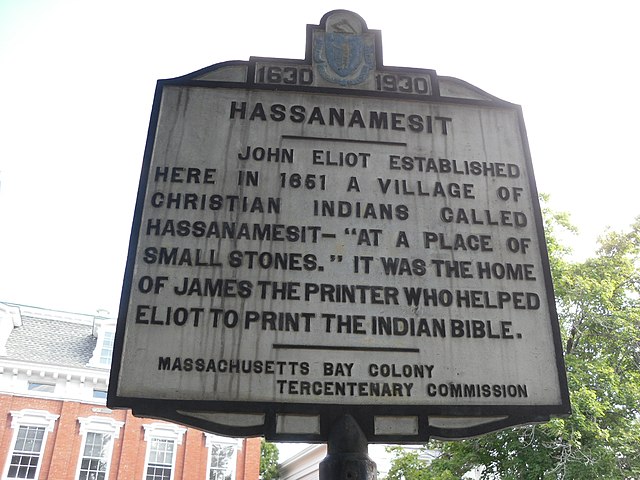Top Qs
Timeline
Chat
Perspective
James Printer
17th–18th century Nipmuc printer and scribe From Wikipedia, the free encyclopedia
Remove ads
Wawaus, also known as "James Printer", was a Nipmuc leader from Hassanamesit (today Grafton, Massachusetts), who the incorporation and marginalization of his people in colonial Massachusetts.[1] He is most commonly known for his work at the first printing press in the American colonies, yet like many Indigenous people during the 17th century in New England, was mistreated, abused, arrested, threatened, falsely imprisoned, and forced into exile on Deer Island in the Boston Harbor by the newly settled foreign imperialists. He helped produce the first Indian Bibles in the Massachusett language (an Algonquin language), which were used by English colonists in the cultural assimilation of Native Americans. He also set the type for books including the famous Narrative of the Captivity and Restoration of Mrs. Mary Rowlandson.[2]

Remove ads
Early life
Little is known of Printer's early years.[3] Printer was born at Hassanamesit near what is now Grafton, Massachusetts.[4] He was the son of Naoas.[4] Naoas was a convert of John Eliot and a leading member of the Christian Native church in Hassanamesit.[4]
Education
Printer attended Harvard's Indian College beginning in 1659.[5] He worked as an apprentice to Samuel Green at his printing press.[5] Through his apprenticeship he became an accomplished typesetter and translator.[4] He lived and worked among the English for nearly his entire life.[4]
Printing career
Summarize
Perspective
Printer was the first Native American printer's devil in America.[3] He played an instrumental role in the printing of John Eliot's Indian Bible, the first bible printed in America which was printed in the Massachusett language.[5] Printer helped to complete a thousand copies of the Indian Bible before the end of 1663.[6] While other Native Americans helped Eliot in the creation of his Bible, Printer is said to have been Eliot's most accomplished interpreter who did more than any of the other interpreters to translate the Bible into the Massachusett dialect.[3] Several scholars point out the bible was most likely composed by Native Americans and that Printer along with Cockenoe and Job Nesuton deserve at least equal credit for the production of Eliot's collection of publication in Native American languages.[7]
In addition to the Indian Bible, Printer helped to produce Indian Primers and two books of Psalms.[4] He also typeset Puritan missionary works which publicized his and other Christian Native Americans' piety.[8] Involved in the typesetting of the Cambridge editions of Mary Rowlandson's famous captivity narrative, A Narrative of the Captivity and Restoration of Mrs. Mary Rowlandson, in which he appears as a minor character during Rowlandson's ransom negotiations.[9]
Printer worked as a typesetter for sixteen years before the outbreak of King Philip's War.[8]
King Philip's War
Summarize
Perspective
Printer's major contribution to American literature came during King Philip's War while he worked as a scribe for King Philip also known as Metacomet.[3]
During the war, Printer left Cambridge for Hassanamesit.[8] At the outbreak of King Philip's War, Printer was falsely accused of participating in the Lancaster raid, a raid on Lancaster, Massachusetts.[8] He narrowly escaped death after an English mob accused him.[8] Following his escape, the town of Hassanamesit was confronted by Nipmucs from Menimesit. They carried an urgent message, asking the families at Hassanamesit to “go with them quietly” to Menimesit. They warned, if “you go to the English again” they would “force you all to some Island as the Natick Indians are, where you will be in danger and starved with cold and hunger, and most probably in the end be all sent out of the country for slaves.” [10][8] Printer along with the other inhabitants chose to go with Metacomet's men.[8] During his willing captivity, it is believed, Printer along with other Native American Christian captives came to sympathize with Metacomet's men.[8]
Printer is known for two letters he produced during King Philip's War.[4] These letters were written from the Native Americans to the English.[4]
The first of the two notable letters was found tacked to a bridge post outside of the town of Medfield, Massachusetts in 1675.[4] While the note was unsigned, several scholars attribute the note to James Printer.[5] The note states that the English have provoked the Native Americans to war and that the Native Americans have nothing to lose in the fight but their lives while English may lose their property and possessions.[4] This letter is notable due to its shrewdness to recognize that the loss of the colonists' private property would make them vulnerable.[8] In addition the fact that the message was written in English was evidence that it could only have come from a Native American with extensive Christian education [8] which showed the Englishmen's attempts to assimilate Native Americans was not wholly successful.[11][12]
The second letter is known to have been written by Printer during King Philip's War.[4] This letter concerns the ransom for Mary Rowlandson, Mrs. John Kettell, and other colonists held captive by King Philip's men.[4] This letter was part of the negotiation for the release of Rowlandson and her fellow captives.[4] The letter can be read as an attempt by Printer to mend fences with the English.[4] The letter is an extraordinary example of early Native American writing which shows Printer's writing skills.[3] Ironically he later worked as the typesetter for Mary Rowlandson's narrative of her captivity The Sovereignty and Goodness of God published in 1682.[4]
After the war Printer was granted amnesty.[13]
Remove ads
Later life
After King Philip's War, Printer returned to work as a printer in Cambridge.[5] He later returned to Hassanamesit and taught there as a leader.[5][3] Following the war Printer advocated for Nipmuck land holdings.[14][5]
References
Wikiwand - on
Seamless Wikipedia browsing. On steroids.
Remove ads
